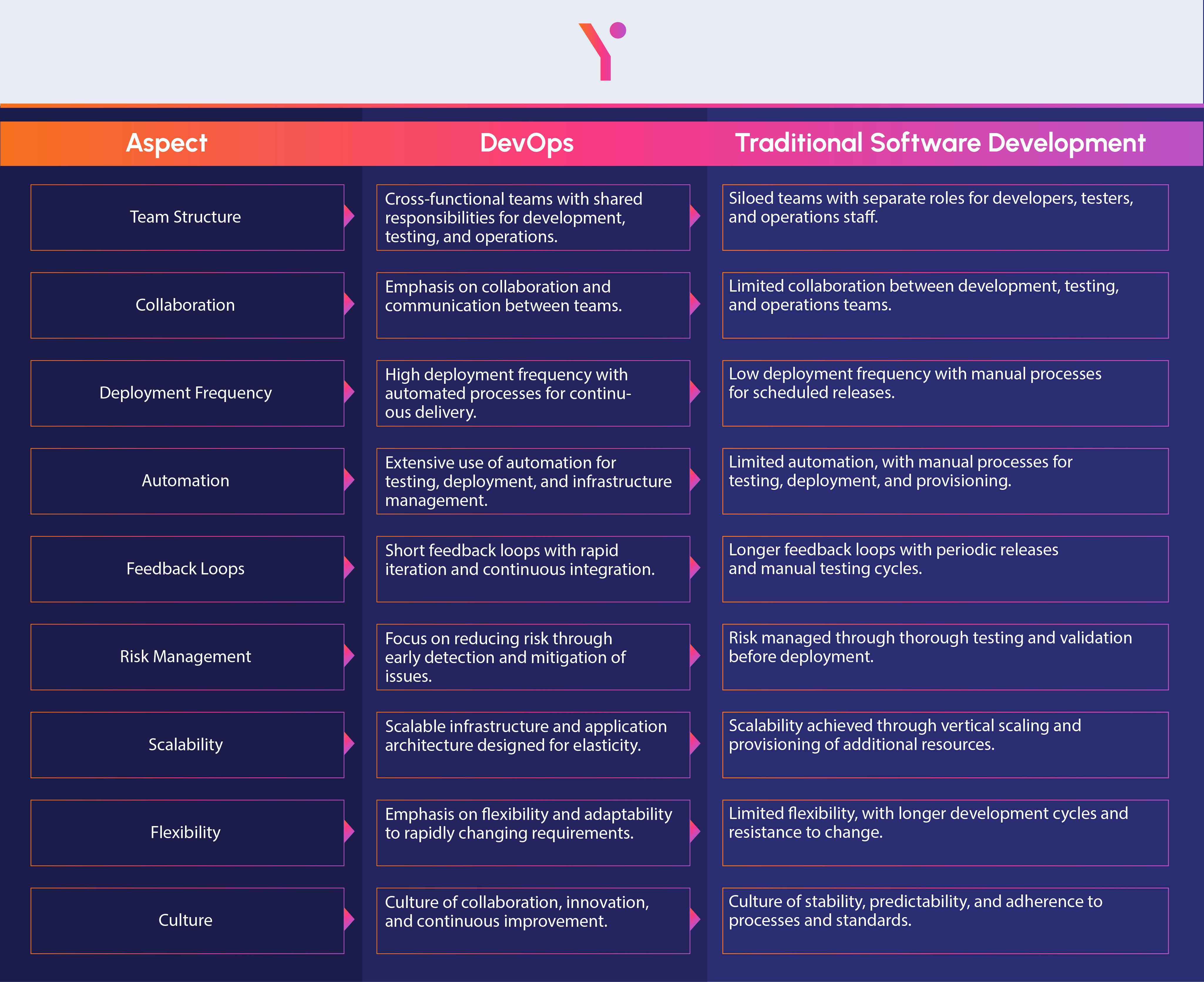Introduction
DevOps is creating an environment for software developers that allows them to maximise their production and improve task efficiency. That being said it is necessary for businesses to be aware of the DevOps best practices. That is exactly what this article is going to discuss.
The DevOps methodology has changed the way businesses perform their daily operations in a streamlined and efficient manner. Studies have concluded that the global market size of DevOps is set to reach $25.5 billion by 2028. This is a rapidly expanding market and the demand for DevOps professionals and DevOps managed service providers has increased by 56% from 2017 to 2022.
This shows that the DevOps methodology is here to stay. In this article, we will touch upon DevOps best practices and everything you need to know when opting to incorporate the DevOps methodology in your organisation.
Traditional Software Development vs. DevOps Methodology
Traditional software development has been the cornerstone of every software development organisation for decades. While the traditional method worked, the DevOps methodology brings a new perspective to software development and makes tasks quicker and efficient.
Following is a fair comparison between the two development methodologies:

Importance of DevOps Methodology
Before we can dive into the best practices, we first need to understand the importance of DevOps. The DevOps industry is growing at an exponential rate, making it apparent that the benefits it is providing organisations are significant. Let’s discuss these benefits:
Accelerated Software Delivery
DevOps promotes the adoption of agile principles and practices, enabling organisations to deliver software faster and more frequently. By breaking down silos between development and operations teams and implementing automation, DevOps streamlines the software delivery pipeline, reducing time-to-market and increasing competitiveness.
Improved Collaboration
DevOps fosters a culture of collaboration and shared responsibility among developers, operations engineers, quality assurance professionals, and other stakeholders. By breaking down organisational barriers and encouraging cross-functional teams, DevOps promotes better communication, alignment of goals, and faster problem resolution.
Enhanced Quality and Stability
Through practices such as continuous integration, continuous delivery, and automated testing, DevOps helps organisations improve the quality and stability of their software products. By automating repetitive tasks, identifying and fixing defects earlier in the development process, and deploying changes in small, incremental steps, DevOps reduces the risk of errors and outages in production environments.
Increased Efficiency and Productivity
DevOps practices such as infrastructure as code (IaC), configuration management, and automated deployment pipelines enable organisations to achieve greater efficiency and productivity. By automating manual tasks, reducing deployment errors, and enabling faster feedback loops, DevOps allows teams to focus on value-added activities and innovation.
Scalability and Flexibility
DevOps provides organisations with the scalability and flexibility needed to adapt to changing business requirements and market conditions. By leveraging cloud computing, containerisation, and other technologies, DevOps enables organisations to rapidly provision and scale infrastructure, deploy applications in diverse environments, and respond quickly to customer feedback and market demands.
Continuous Improvement
DevOps emphasises the importance of continuous improvement and learning. By implementing feedback mechanisms, monitoring and measuring key performance indicators (KPIs), and conducting regular retrospectives, organisations can identify areas for improvement, optimise their processes, and drive innovation.
DevOps Best Practices That Can Improve Efficiency
Efficiency in the software development can make a substantial impact when it comes to growing your organisation. Following are the best practices that you can incorporate to improve your DevOps processes.
Continuous Integration and Continuous Deployment (CI/CD):
- Best Practice: Automate the integration and deployment process to ensure that code changes are quickly and safely deployed to production.
- Impact: Faster time to market, reduced risk of errors, and improved collaboration between development and operations teams.
Infrastructure as Code (IaC):
- Best Practice: Use code to provision and manage infrastructure, allowing for consistency, repeatability, and scalability.
- Impact: Reduced manual errors, improved infrastructure management, and faster deployment of resources.
Microservices Architecture:
- Best Practice: Architect applications as a collection of loosely coupled, independently deployable services.
- Impact: Increased agility, scalability, and resilience, as well as improved fault isolation and easier maintenance.
Monitoring and Logging:
- Best Practice: Implement robust monitoring and logging solutions to track application performance, detect issues, and troubleshoot problems.
- Impact: Faster incident response, improved system reliability, and enhanced visibility into application health.
Automated Testing:
- Best Practice: Automate testing at every stage of the development pipeline, including unit tests, integration tests, and end-to-end tests.
- Impact: Higher software quality, reduced time spent on manual testing, and increased confidence in code changes.
Security Integration:
- Best Practice: Bake security into every stage of the development lifecycle, including code scanning, vulnerability assessment, and access control.
- Impact: Reduced security vulnerabilities, improved compliance with regulatory requirements, and enhanced trust with customers.
Collaborative Culture:
- Best Practice: Foster a culture of collaboration, communication, and shared responsibility between development and operations teams.
- Impact: Improved teamwork, faster problem resolution, and increased innovation and creativity.
Feedback and Continuous Improvement:
- Best Practice: Solicit feedback from users and stakeholders, analyse metrics and KPIs, and use insights to continuously improve processes and products.
- Impact: Higher customer satisfaction, faster innovation cycles, and a culture of learning and adaptation.
Future DevOps Trends
With DevOps growing, it is natural to see emerging trends in the market. Following are some of the expected trends in the DevOps market.
GitOps Adoption
GitOps, an operating model for Kubernetes and cloud-native applications, is gaining traction. It leverages Git as a single source of truth for infrastructure and application configurations, enabling automated deployments, observability, and compliance.
AI and Machine Learning in DevOps
AI and ML technologies are increasingly being integrated into DevOps toolchains to automate tasks such as code reviews, testing, and monitoring. This trend enables predictive analytics, anomaly detection, and intelligent automation for more efficient and resilient systems.
Site Reliability Engineering (SRE)
SRE practices, pioneered by Google, are becoming more widespread as organizations seek to improve the reliability and resilience of their systems. SRE blends software engineering with operations to design, build, and maintain scalable and reliable services.
Serverless Computing
Serverless architectures, which abstract away infrastructure management, are gaining popularity for their scalability, cost-efficiency, and simplicity. DevOps teams are embracing serverless platforms like AWS Lambda and Azure Functions to deploy and run applications without managing servers.
Shift-Left Security
Security is increasingly being integrated earlier in the software development lifecycle, a concept known as shift-left security. DevOps teams are adopting practices like DevSecOps to embed security controls, vulnerability scanning, and compliance checks into CI/CD pipelines.
Edge Computing
With the proliferation of IoT devices and the need for low-latency processing, edge computing is becoming more prevalent. DevOps teams are exploring how to manage and deploy applications at the edge, closer to end-users, to improve performance and reliability.
Cloud-native Development
As organizations embrace cloud-native architectures, DevOps practices are evolving to support microservices, containers, and orchestration platforms like Kubernetes. Cloud-native development enables scalability, resilience, and agility in building and deploying applications.
Observability and Distributed Tracing
With the complexity of modern distributed systems, observability and distributed tracing are becoming essential for understanding system behavior and diagnosing issues. DevOps teams are adopting tools like Prometheus, Grafana, and Jaeger to gain insights into application performance and dependencies.
Infrastructure as Code (IaC) Maturity
IaC, the practice of managing infrastructure through code, continues to mature with the rise of declarative configuration tools like Terraform and Pulumi. DevOps teams are embracing IaC to provision, configure, and manage infrastructure as part of automated pipelines.
Hybrid and Multi-cloud Deployments
Organizations are increasingly adopting hybrid and multi-cloud strategies to leverage the benefits of multiple cloud providers and on-premises environments. DevOps teams are building tools and processes to manage and orchestrate applications across diverse infrastructure environments.
Conclusion
DevOps can make a substantial difference in your software development practices. From better development processes to enhanced feedback and improvements, DevOps is paving the way for businesses to aim for growth.
If you are looking for an organisation that can serve as a Kubernetes consulting company, DevOps service provider, or offer Microservices architecture services, FuturByte is your go-to organisation.
Frequently Asked Questions
DevOps improves software development by streamlining processes, reducing manual errors, increasing deployment frequency, enhancing collaboration, and fostering a culture of continuous improvement.
The key principles of DevOps include automation, continuous integration, continuous delivery, infrastructure as code, monitoring, and collaboration.
Continuous integration is the practice of automatically integrating code changes into a shared repository multiple times a day. It helps identify and fix integration errors early in the development process.
Continuous delivery is the practice of automatically deploying code changes to production or staging environments after passing automated tests. It enables teams to release software updates quickly and reliably.
Infrastructure as code is the practice of managing and provisioning infrastructure resources using code and automation tools. It allows infrastructure to be version-controlled, tested, and deployed like software.
Have questions or feedback?
Get in touch with us and we‘l get back to you and help as soon as we can!




